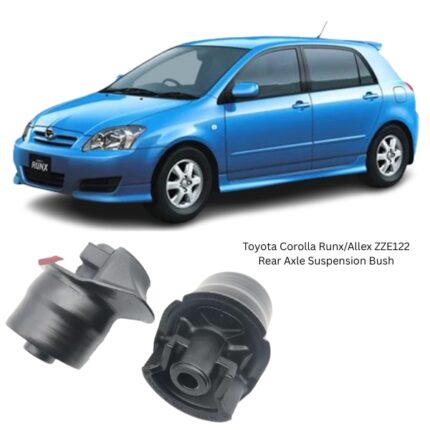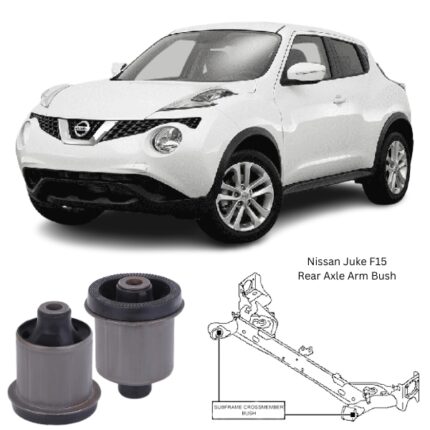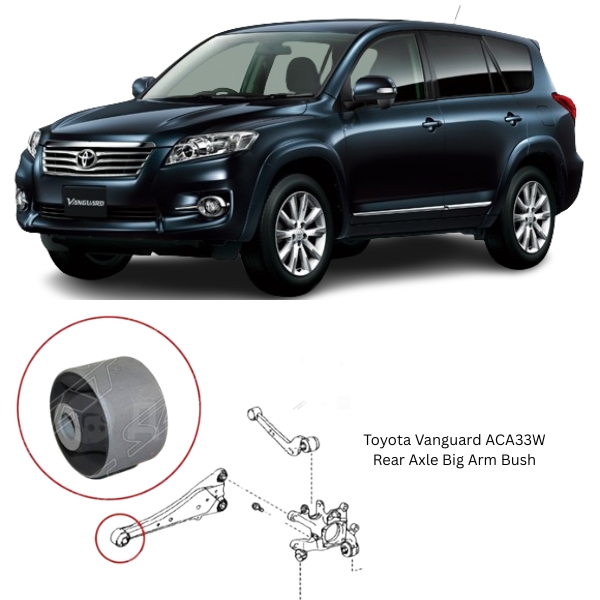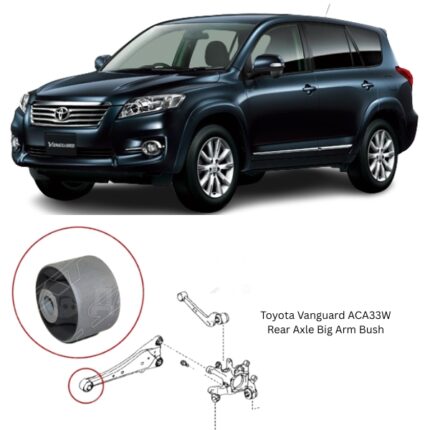Get Toyota Vanguard ACA33W Rear Axle Big Arm Bush 48710-0R010 in Kenya
The Rear Axle Big Arm Bush is a specialized suspension component that connects the rear trailing arm—often referred to as the “big arm”—to the chassis or axle assembly of a vehicle. This bushing allows for controlled articulation and vibration dampening while maintaining stability, wheel alignment, and ride comfort. Despite its small size and often unnoticed placement, the rear axle big arm bush plays a critical role in ensuring consistent handling, effective braking, and overall suspension integrity.
Rear axle suspension systems are subjected to immense forces due to road irregularities, vehicle load, acceleration, and braking. The big arm bush, placed at a pivotal joint, absorbs and cushions these forces, preventing harsh impacts and structural damage. Designed with a combination of high-durability rubber or polyurethane and metal sleeves, the big arm bush endures constant mechanical stress while maintaining flexibility and strength.
Primary Role and Function
The Rear Axle Big Arm Bush is responsible for ensuring the secure, quiet, and flexible connection between the rear control arm (big arm) and either the vehicle’s subframe, axle beam, or chassis mount. Its key functions include:
-
Vibration Dampening
Absorbs road shocks, bumps, and vibrations, ensuring they are not transmitted to the chassis or passenger cabin. -
Pivot and Movement Control
Permits controlled movement of the rear trailing arm during suspension travel, supporting a stable and responsive ride. -
Maintains Rear Wheel Alignment
Keeps the rear wheels properly positioned in relation to the chassis, ensuring straight tracking and even tire wear. -
Load Distribution
Shares the burden of vehicle weight and dynamic road forces, reducing stress on the rear axle and suspension joints. -
Suspension Geometry Stability
Supports consistent handling by maintaining proper camber and toe angles in the rear suspension setup. -
Protection for Other Components
Prevents metal-on-metal contact between moving parts, extending the life of adjacent components such as trailing arms, coil springs, dampers, and shock absorbers.
Design and Construction
The Rear Axle Big Arm Bush is a composite component made to resist fatigue, compression, heat, and environmental exposure.
Key Components:
-
Outer Shell
Typically made from steel or aluminum, this metal casing fits securely into the rear control arm or axle housing, acting as a press-fit anchor for the entire bush. -
Inner Sleeve
A steel tube or cylinder located at the core of the bush. It serves as the interface for the mounting bolt that holds the trailing arm in place. -
Elastomeric Core (Rubber or Polyurethane)
Sandwiched between the inner sleeve and outer shell, this layer is the heart of the bushing. It provides flexibility and absorbs torsional and axial loads. -
Void Geometry (Optional)
Some designs include engineered voids or grooves within the rubber to tailor performance in specific directions—improving comfort or stiffness where needed. -
Bonding Adhesive
A high-strength vulcanizing agent is used to permanently bond the rubber to the inner and outer sleeves, ensuring that the bushing can withstand constant movement and pressure without separation. -
Protective Coating
Both metal components are often coated with rust- and corrosion-resistant finishes, such as zinc plating or powder coating, to extend their service life in all weather conditions.
Performance Characteristics
A well-functioning Rear Axle Big Arm Bush ensures the suspension operates smoothly and consistently, especially in demanding driving conditions. Its performance can be characterized by:
-
High Load Tolerance
Designed to endure vertical loads from the vehicle weight and lateral loads from cornering, without cracking or deformation. -
Controlled Flexibility
Allows enough compliance to absorb shock, but remains stiff enough to prevent excessive movement that could affect vehicle handling. -
Excellent Noise, Vibration & Harshness (NVH) Reduction
Significantly reduces road noise and harsh feedback from reaching the passenger compartment. -
Temperature Resistance
Capable of withstanding a wide range of temperatures, from sub-zero cold to the heat generated by road surfaces and nearby exhaust components. -
Chemical Resistance
Withstands degradation from oils, brake fluids, road salts, and moisture that may otherwise weaken conventional materials. -
Durability
Built to last tens of thousands of kilometers under normal conditions, or even longer with upgraded materials such as polyurethane.
Common Symptoms of Worn or Failing Bushes
Like all suspension components, the Rear Axle Big Arm Bush degrades over time due to wear, age, and exposure. Common signs that indicate it’s time for replacement include:
-
Clunking or Banging Noises
When the rubber deteriorates or separates from the metal, it causes movement that results in noise during driving over bumps or during braking. -
Loose or Wandering Rear End
Excessive play in the rear suspension can cause the vehicle to feel unstable, especially while cornering or changing lanes. -
Uneven Tire Wear
A worn bush may cause misalignment in the rear wheels, leading to abnormal or premature tire wear. -
Increased Vibration in the Cabin
If the bushing fails to absorb road impacts, you may feel more vibration through the floor or seats. -
Visible Cracks or Gaps in the Rubber
During inspection, cracked, split, or missing rubber sections are clear signs of a failing bush. -
Delayed Braking Response
When the rear suspension moves excessively during deceleration, it can lead to a “loose” feeling when braking.
Installation Guidelines
Replacing the Rear Axle Big Arm Bush typically involves removing the trailing arm or axle component and pressing out the old bush. The process varies depending on vehicle design but generally includes:
-
Vehicle Preparation
Lift the vehicle safely using a jack and secure it with stands. Remove the relevant rear wheel to access the trailing arm. -
Component Disassembly
Detach the trailing arm or axle mount from the chassis. This may require removing bolts or brackets and supporting the axle. -
Old Bush Removal
Use a press or bushing removal tool to extract the worn bush. Take care not to deform the housing. -
New Bush Installation
Lubricate and press the new bush into place, ensuring alignment with any orientation marks. -
Reassembly and Torqueing
Reattach the trailing arm, torque bolts to specification, and ensure proper alignment of the rear suspension. -
Alignment Check
A professional alignment is recommended after installation to restore rear suspension geometry.
Maintenance and Replacement Schedule
The Rear Axle Big Arm Bush does not typically have a set maintenance interval but should be inspected regularly, especially:
-
During routine suspension service
-
When replacing shocks, springs, or control arms
-
After an accident or heavy impact
-
When experiencing symptoms of suspension instability
Replacement frequency depends on driving conditions. Rough terrain, aggressive driving, or heavy loads may reduce lifespan significantly.
Benefits of Timely Replacement
-
Restored Handling Stability
Keeps the vehicle tracking straight and responding predictably during turns and braking. -
Enhanced Ride Comfort
Eliminates excess vibration and noise from worn suspension joints. -
Improved Tire Longevity
Helps maintain correct wheel alignment, reducing uneven tire wear. -
Increased Safety
Ensures full suspension control under heavy loads, high speeds, or emergency braking. -
Reduced Wear on Other Components
Helps protect rear shocks, springs, and arms from excessive movement and impact damage.
Follow us on Facebook for more parts.





Reviews
Clear filtersThere are no reviews yet.